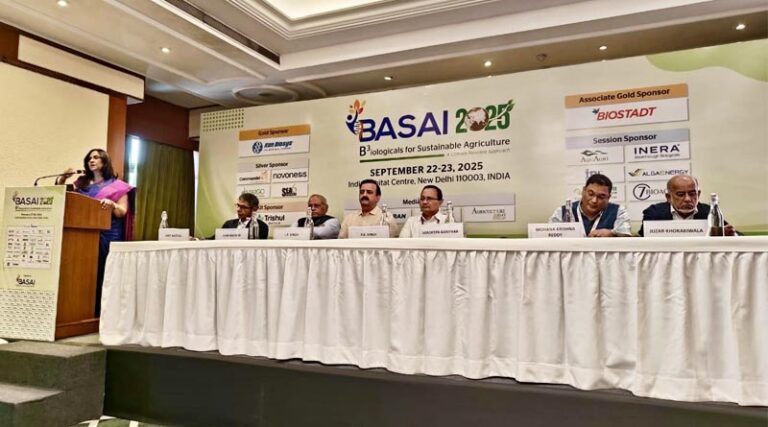
Industry Must Act to Reinforce Confidence in Biologicals in India: BASAI 2025
22 September 2025, New Delhi: The inaugural day of BASAI 2025, the national conference on “Biologicals for Sustainable Agriculture – A Climate Resilient Approach”, was held in New Delhi. Organized by the Biological Agri Solutions Association of India (BASAI), the event brought together government officials and industry leaders to discuss the role of biological inputs in shaping India’s agricultural future.
The conference opened against the backdrop of growing concerns from the Ministry of Agriculture over the quality and counterfeiting of biostimulants, an issue that has drawn increasing regulatory attention. At the same time, India’s biologicals sector is on a sharp growth trajectory, with the biostimulants market alone expected to nearly triple from USD 410.78 million in 2022 to USD 1,135.96 million by 2032 as per the association. The biofertilizers market is forecast to reach USD 399.67 million by 2033 at a CAGR of 11.50 percent, while biopesticides continue to record double-digit growth.
Regulatory Framework and Industry Role in Building Trust
At the inaugural session, Mr. P.K. Singh, Agriculture Commissioner, Department of Agriculture and Farmers Welfare, Ministry of Agriculture, highlighted the progress India has made in establishing a robust regulatory framework for the biologicals sector. “These regulations will help farmers access the best products, improve productivity and profitability, and build long-term trust,” he said. “Integrated pest management, when applied correctly, has consistently delivered optimum crop performance at low cost. I am confident that the private sector will continue to bring research and innovations to Indian farmers, enabling them to adopt sustainable farming practices.”
From the industry perspective, Sandeepa Kanitkar, President of BASAI, emphasized the critical role biologicals can play in closing productivity gaps while safeguarding soil health and food safety. She pointed out that BASAI now has more than 50 members working closely with the Central Insecticides Board and Registration Committee and the Department of Fertilizer. “Soil health, food safety, and environmental protection are essential. Farmers can only benefit if agriculture is sustainable. With the right policy support, India has the potential to become a global leader in biostimulants, biofertilizers, and biopesticides,” she said. Kanitkar also highlighted BASAI’s initiatives to collaborate with chemical companies, aiming to enhance fertilizer use efficiency, address pesticide resistance, and deploy innovative carbon sequestration technologies to restore depleted soils.
Dr. J.P. Singh, Additional Plant Protection Advisor, Ministry of Agriculture and Farmers Welfare, underlined the importance of aligning biological use with export standards. He stressed that collaboration with APEDA is vital to reduce rejections in international markets due to breaches in Maximum Residue Levels (MRLs). “This is the need of the hour. The private input sector must work closely with export-oriented units and Farmer Producer Organizations, guiding them through processes that reduce chemical loads on crops. Demonstrating product efficacy directly to farmers is the most effective way to build trust,” he said.
Direct Farmer Engagement Key to Reinforcing Confidence
Echoing Dr. Singh’s point, Juzar Khorakiwala, CMD of Biostadt and former Chair of BASAI, stressed the power of direct farmer engagement. “Limited outreach has been a challenge, and Dr. Singh is absolutely right,” he said. “We began pioneering work with seaweeds in 1988, but true impact comes from connecting directly with farmers—through on-field demonstrations, explaining how products work, and building trust. This hands-on approach has been central to Biostadt’s position in the market today.”
Vipin Saini, CEO of BASAI, reinforced the significance of farmer engagement and transparency in securing the sector’s future. “India’s farmers are the backbone of our food system. BASAI 2025 is about equipping them with science-backed, practical solutions that deliver results, not just theoretical promises. Our focus is to make it easier for our members to operate while simultaneously building farmer confidence in biologicals. Field demonstrations, awareness campaigns, and clear communication about product performance are essential to earning and maintaining that trust,” he said.
Also Read: SML Limited Nematicide Receives Provisionally Approved ISO Common Name “Fenargimine”
📢 If You’re in Agriculture, Make Sure the Right People Hear Your Story.
From product launches to strategic announcements, Global Agriculture offers unmatched visibility across international agri-business markets. Connect with us at pr@global-agriculture.com to explore editorial and advertising opportunities that reach the right audience, worldwide.






